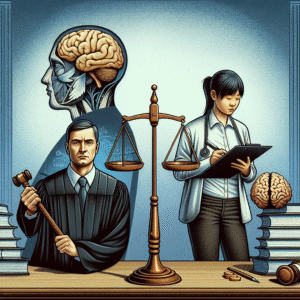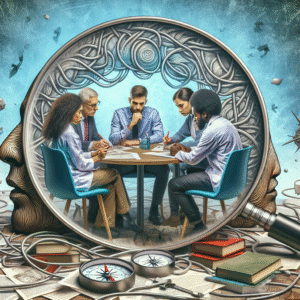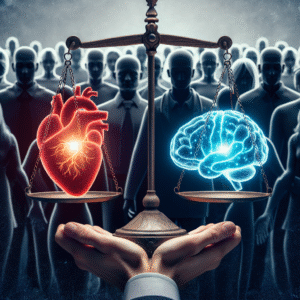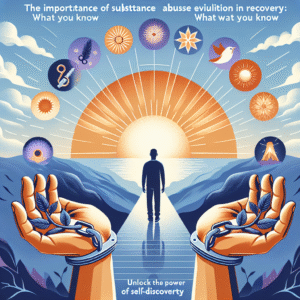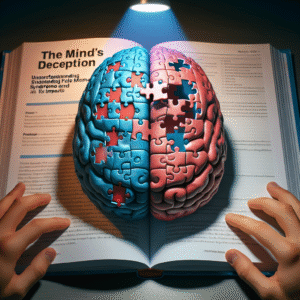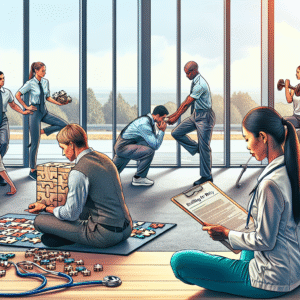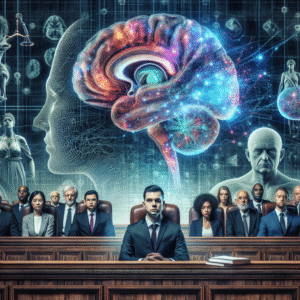Introduction Imagine sitting in a courtroom, surrounded by stark realities. You hear stories of pain, resilience, and the quest for justice. Among the voices rises a delicate yet powerful narrative—the toll of trauma, often hidden yet profoundly impactful. This brings us to the intersection of trauma and legal proceedings: Trauma on Trial: The Role of PTSD in Personal Injury...
Hostage Negotiation
Introduction In recent years, the concept of holistic healing has gained considerable traction in various disciplines, especially in rehabilitation programs. The understanding that mental health is just as crucial as physical recovery has led to a paradigm shift in how we approach rehabilitation. Holistic healing is no longer just a buzzword; it’s an essential framework for comprehensive recovery. In...
Introduction In a world increasingly aware of mental health issues, the complexities surrounding trauma have become a focal point of discussion among healthcare providers, counselors, and individuals alike. Navigating the Complexities of Trauma: Effective Assessment Strategies is not just an academic exercise; it reflects the urgent need to understand and treat trauma effectively. Our lives are often enriched or...
Introduction In recent years, the intersection of mental health and criminal justice has captivated public discourse, revealing stark disparities between treatment and punishment. From Treatment to Punishment: How the Justice System Handles Mental Health is not just a theoretical discussion; it affects lives daily. According to the National Alliance on Mental Illness (NAMI), nearly 20% of individuals involved in...
Introduction In an era marked by rapid societal change and evolving moral landscapes, few topics provoke as intense a debate as capital punishment. "Capital Punishment Under the Microscope: Analyzing Efficacy and Ethics" is crucial in understanding whether this ultimate form of justice serves a meaningful purpose in modern society. With an estimated 2,500 inmates currently on death row in...
Introduction In the heart of America’s criminal justice system lies a staggering truth: a significant number of individuals behind bars are grappling with addiction. As society struggles to reconcile issues of crime, punishment, and public health, one question looms large — how do addiction and incarceration intersect, and what does it mean for the future of our communities? The...
Introduction In the landscape of criminal justice, few concepts inspire as much heated debate as sentencing. The traditional view often focuses on punishment as retribution for wrongdoing. However, an emerging paradigm challenges this notion: Beyond Punishment: Exploring the Role of Sentencing Mitigation in Criminal Justice. This approach suggests that understanding the underlying causes of criminal behavior and incorporating sentencing...
Introduction Imagine a quiet neighborhood disrupted by a surge of crime and violence, where the dynamics of group behavior dictate the lives and choices of individuals. In these scenarios, the power of persuasion plays a critical role, shaping decisions and actions within gangs. Understanding the concept of groupthink is essential not only for criminologists but also for educators, parents,...
Introduction In an era where cyber threats loom larger than ever, understanding The Role of Threat Assessment in Cybersecurity: Staying One Step Ahead is essential for any organization. Just as a seasoned chess player anticipates the opponent’s moves, cybersecurity professionals must proactively identify and assess potential threats. This article explores the significance of threat assessment and its immense value...
Introduction Imagine standing at the edge of a precipice, peering into the abyss of decisions made not in isolation but as part of a collective that can both uplift and imprison. Gang dynamics are powerful mechanisms, shaping not just the identities of individuals but also the choices they make. In this in-depth exploration, "Gang Dynamics: A Deep Dive into...
Introduction In a world marked by increasing diversity, the field of forensics plays a pivotal role in ensuring justice for all. Whether it’s analyzing DNA, interpreting psychological profiles, or gathering eyewitness testimony, the nuances of culture significantly impact every facet of forensic work. Cultural competence in forensics isn’t just a buzzword; it’s an essential component in enhancing justice through...
Introduction In the digital age, the landscape of white-collar offenses has undergone a seismic shift. Gone are the days when embezzlement and insider trading were the primary concerns of corporate security. Today, we are increasingly confronted with a hybrid beast: a blend of cybercrime and corporate fraud. The phrase "Cybercrime and Corporate Fraud: The New Face of White-Collar Offenses"...
Introduction In a world where the intersection of law and psychology plays a pivotal role in determining the outcomes of critical legal cases, the intricate dance between justice and ethics is more relevant than ever. Justice vs. Ethics: The Complex Role of Forensic Psychologists encompasses not just the duties of professionals in this field, but the profound implications their...
Introduction In our increasingly complex world, trust has become a scarce commodity. The phrase "trust but verify" resonates more than ever, especially as fraud cases continue to shake our confidence in various institutions. From financial scams to deceptive marketing practices, understanding the psychological underpinnings of distrust is crucial. This brings us to Decoding Distrust: The Cognitive Biases that Enable...
Introduction Imagine a world where justice doesn’t just punish but heals. In the realm of criminal justice, mental health courts are becoming a beacon of hope for individuals grappling with mental illness, providing pathways not only for legal redress but also for genuine recovery. Healing Through Justice: The Impact of Mental Health Courts on Individuals and Communities is a...
Introduction In an ever-evolving digital landscape, where interactions and connections often occur through screens rather than face-to-face, the threat of online predation has escalated alarmingly. From Grooming to Exploitation: The Stages of Online Predation is a crucial narrative that sheds light on this dark side of the internet. Understanding these stages is not just relevant; it is essential for...
Introduction In a world where substance abuse can devastate lives and tear apart families, understanding the role of evaluation in the recovery process is more crucial than ever. The importance of substance abuse evaluation in recovery: what you need to know can be a game-changer for individuals seeking help. It serves as the foundation upon which effective treatment plans...
Introduction As our world becomes hyper-connected, the digital domain increasingly reflects our complex human nature. From identity theft to hacking and online fraud, cybercrime is a pervasive issue that raises pressing questions: What drives individuals to engage in such crimes? Understanding these motivations is crucial not only for law enforcement but for anyone who uses digital platforms. In this...
Introduction Imagine recalling a cherished childhood memory—playing with friends at a family picnic, laughter ringing in the air, the scent of barbecue wafting around. Now, picture being told that this memory never occurred. Welcome to the intriguing yet unsettling concept of False Memory Syndrome. As our brains intricately weave narratives, they sometimes create convincing fabrications, blurring the line between...
Introduction Imagine waking up one day to the stark news of an attack that shatters lives and spreads panic like wildfire. The immediate emotional reactions—fear, anxiety, confusion—do not merely affect those directly impacted; they ripple through societies, cultures, and nations. Understanding the psychological mechanisms behind such terror is crucial in grasping the power of fear and manipulation within the...
Introduction In a world fraught with conflict and uncertainty, the art of negotiation takes center stage, especially during extreme scenarios where stakes are high. One such critical area is hostage negotiation. Imagine a life-threatening crisis looming over negotiations with dramatic twists and turns. What sounds like a high-stakes thriller is instead a reality for skilled negotiators whose primary goal...
Introduction In today’s interconnected world, the internet serves not just as a tool for communication and information sharing, but as a powerful catalyst for social change—both good and bad. One of the more concerning aspects of this digital ecosystem is its role in radicalization. The rise of extremist ideologies online has profound implications for both individuals and society at...
Introduction In an era where extremism seems to take root more deeply with each passing day, understanding and assessing radicalization is critical. "From Awareness to Action: Effective Strategies for Radicalization Assessment" is not just a tagline but a call to action for communities, policymakers, and analysts alike. The consequences of failing to address radicalization can be catastrophic, affecting the...
Introduction In moments of crisis, the immediate response often focuses on physical well-being—stopping the bleeding, stabilizing vitals, or ensuring safety. However, a burgeoning conversation is beginning to resonate in both medical and social spheres: Beyond First Aid: The Importance of Mental Health in Crisis Interventions. It’s an undeniable fact that mental health plays an equally crucial role in the...
Introduction In a world perpetually shaken by violence and turmoil, understanding the underpinning mechanisms of terrorism has never been more pivotal. The results of terror attacks reverberate far beyond immediate casualties, stretching deep into the psyche of entire communities and nations. The emotions of "fear" and "fury" are at the core of these tactics, engendering a cycle that both...
Introduction Imagine being thrust into a high-stakes scenario where every word you utter can mean the difference between life and death. The role of a hostage negotiator is fraught with pressure, uncertainty, and an unwavering commitment to saving lives. Behind the Scenes: A Day in the Life of a Hostage Negotiator unveils the gripping reality of this demanding profession....
Introduction In the digital age, scamming has evolved from street cons to sophisticated cyber schemes that exploit not just technology, but human psychology. As we find ourselves entwined in a web of digital interactions, the importance of understanding these tactics cannot be overstated. "Digital Deception: Understanding the Psychological Tactics Behind Cyber Scams" sheds light on the cunning methods employed...
Introduction Imagine walking into an interview room. You’re well-prepared, dressed to impress, and have a firm grasp of your qualifications. Yet, as you sit down, the interviewer seems less engaged. You might wonder: What unspoken signals are at play? In the world of job interviews, body language in interviews: what your non-verbal cues are saying can be as crucial...
Introduction When it comes to solving crimes, intuition and instinct are essential, but in today’s data-driven world, science has emerged as a powerful ally. Enter the methodology known as Geographic Profiling, a fascinating blend of geography, psychology, and data analytics that can make or break a case. The phrase "Location, Location, Location" has defined real estate for decades, but...
Introduction The moment you step through the heavy steel doors of the interrogation room, you can almost feel the weight of the unseen stories that haunt its walls. It’s a space where truths and lies collide; where emotions run high, and every word matters. Understanding what happens inside the interrogation room is vital—not only for aspiring detectives or criminal...
Introduction Imagine walking through a crowded market and suddenly becoming acutely aware of someone’s nervous fidgeting, the way they avoid eye contact, or their abrupt changes in tone. What if you could decode these subtle signals to better understand their emotions and intentions? Welcome to the world of behavioral evidence analysis, where the intricacies of human behavior are laid...
Introduction In the realm of criminal justice, the term "competency" is a critical factor that can significantly influence the outcomes of legal proceedings. The journey from being a defendant to reaching a determination of competency is a multifaceted process, steeped in psychological assessments and legal standards. Understanding this journey not only sheds light on the complexities of our legal...
Introduction Workplace violence is a pressing issue that can have devastating impacts on both employees and organizations. From verbal abuse to physical attacks, the spectrum of violence in the workplace is alarmingly broad. According to the Occupational Safety and Health Administration (OSHA), businesses must act to safeguard their employees against potential threats, highlighting the urgency of Preventing Workplace Violence:...
Introduction The courtroom drama surrounding legal trials engages with the vast complexities of human behavior, morality, and mental health. Among the most contentious issues is the insanity defense—a legal argument that has stirred public opinion, influenced laws, and reshaped the conversation about mental illness. This in-depth exploration of High-Profile Cases that Shook Public Perception of the Insanity Defense delves...
Introduction In the ever-evolving landscape of workplace safety and productivity, the concept of fitness for duty has never been more crucial. Employers are tasked not only with ensuring that their teams can perform their roles effectively but also with safeguarding the health and well-being of their employees. Evaluating Fitness for Duty: A Comprehensive Guide for Employers serves as an...
Introduction In a world flooded with information, making sound judgments has never been more vital. Our decisions shape our lives—from the trivial, like choosing a breakfast cereal, to the monumental, such as investing in stocks or selecting a career path. However, lurking behind these decisions are cognitive biases, invisible forces that shape our perceptions and judgments without us realizing....
Introduction Imagine being detained by law enforcement, questioning your rights and understanding of the situation. The moment can be life-altering, with profound implications for your future. One of the cornerstones of ensuring fair treatment in the justice system is the concept of Miranda competence. The term may sound legalistic and intimidating, but it fundamentally serves to protect individual rights...
Introduction The courtroom has long been viewed as the ultimate battleground for justice, where truth collides with perception and reality can be as elusive as it is essential. Yet, when a witness takes the stand, one question often remains: how reliable is their testimony? This brings us to the heart of the matter: Beyond the Witness Stand: The Role...
Introduction Imagine a dimly lit room where the weight of guilt hangs in the air, and the ticking clock intensifies the tension. In this high-stakes environment, the art of interrogation unfolds—an intricate dance of psychology, strategy, and ethics. The Art of Interrogation: How Techniques Shape Justice is not just a matter of extracting confessions; it’s about unearthing the truth...
Introduction In the realm of criminal justice, few issues evoke as much debate and concern as the phenomenon of false confessions. The title From Coercion to Conviction: How Police Interrogation Tactics Lead to False Confessions encapsulates a troubling reality—how supposed methods of extracting the truth can, paradoxically, lead to wrongful convictions. The importance of understanding this topic extends...
Introduction In an era where wrongful convictions and the reliability of eyewitness testimony are under intense scrutiny, Understanding Lineup Procedures: A Guide for Legal Professionals emerges as not just relevant, but crucial. Lineups can be pivotal in identifying suspects, yet they also bear the risk of misidentification. This guide aims to demystify the processes involved in lineups, providing legal...
Introduction Imagine sitting across from someone you trust, only to feel an undercurrent of doubt about the sincerity of their words. What if you could peel back the layers of their communication to reveal the truth lurking beneath? The subtleties of nonverbal communication offer an essential glimpse into the realm of deception detection. Behind the Mask: The Role of...
Introduction: The Fragility of Memory Picture this: You’re in a crowded room, surrounded by friends reminiscing about a shared vacation. Suddenly, someone mentions a funny incident that you clearly remember differently. Confusion ensues, and soon you’re questioning your own recollections. This scenario highlights an unsettling truth about human memory—it’s not as reliable as we might think. Welcome to The...
Introduction Aggression is a complex behavior that has intrigued scientists, psychologists, and philosophers for centuries. With increasing rates of violence in society, understanding aggression has never been more essential. Cognitive and Biological Perspectives on Aggression: Bridging the Gap explores the multifaceted nature of aggression, considering both cognitive processes and biological underpinnings. This article will uncover how these perspectives interact,...
The Importance of Understanding Child Witnesses In the courtroom, the testimonies given by witnesses can shape the outcome of a trial. Among these witnesses, children introduce a unique set of dynamics that warrant careful consideration. In the courtroom: understanding the strength and limitations of child witnesses is essential for legal practitioners, jurors, and society at large. As vulnerable members...
Introduction Domestic violence is a pervasive issue that affects countless individuals and families, often leaving devastating emotional and physical scars. According to the National Coalition Against Domestic Violence, nearly 1 in 4 women and 1 in 9 men experience severe intimate partner physical violence. This article, “Navigating Safety: Essential Resources for Those Affected by Domestic Violence,” aims to...
Introduction: The Weight of Understanding Imagine waking up one day, only to find your world has changed forever. Brain injury can flip life upside down in an instant: relationships can fray, careers can crumble, and dreams can shatter with a single incident. For countless victims, navigating the aftermath is an emotional and financial labyrinth, dominated by uncertainties. That’s why...
Introduction Imagine looking over your shoulder every time you step outside, heart racing with every shadow that passes. For many individuals, this is a daily reality—a chilling consequence of being stalked. While stalking is often understood in its immediate, tangible forms, the hidden, long-term psychological impacts are less frequently discussed. Behind Closed Doors: The Long-Term Psychological Impact of Stalking...
Introduction Imagine walking into a courtroom, not armed with witness testimonies or physical evidence, but with a scan of your brain that reveals deeper truths about your mental state and intentions. This is more than a futuristic concept; it’s the compelling reality of forensic neuroimaging, an emerging field that is poised to revolutionize legal trials. As science and technology...
Introduction In a world where traditional justice systems seem to emphasize punishment over healing, Restorative Justice: A Path Forward for Victims and Offenders emerges as a beacon of hope. This innovative approach to justice redefines the relationship between victims, offenders, and the community, focusing on healing and reconciliation rather than mere retribution. Imagine a system where victims find a...
Introduction Imagine a courtroom where the most compelling evidence isn’t just a confession or a surveillance video, but the very signals emitted by a person’s brain. The intersection of neuroscience and law is no longer the realm of science fiction; it’s a burgeoning field of study impacting judicial decisions, jury perceptions, and the understanding of criminal intent. This article,...
Introduction Imagine a world where victims of crime are not sidelined but rather integrated into the criminal justice process, their voices amplified and their needs prioritized. This vision is not just a utopian aspiration; it represents a critical shift in how we view crime, justice, and rehabilitation. In recent years, there has been an increasing awareness of the value...
Introduction Imagine a world where the voices of the deceased still resonate—we can grasp their struggles, triumphs, and traumas even after they have left this earthly realm. This isn’t the realm of fantasy but a method steeped in psychological exploration: psychological autopsies. Beyond the Grave: How Psychological Autopsies Illuminate Untold Stories serves as both a compelling narrative and a...
Introduction Picture this: You’re standing at the precipice of a decision that could change the course of your life. Should you invest in that new startup? Quit your stable job to pursue your passion? Understanding the psychology of risk and how perception influences decision-making is crucial in today’s uncertain world. The stakes are higher than ever, and our decisions...
Introduction Imagine walking into a courtroom, your heart racing, palms sweaty, as your mind races back to the trauma you endured. For many, this scenario isn’t just fictional; it’s a harrowing reality shaped by the invisible scars of Post-Traumatic Stress Disorder (PTSD). The Silent Struggle: How PTSD Affects Legal Outcomes delves into this complex interplay, exposing the nuances between...
Introduction Imagine a world where individuals who have previously faced incarceration are not just reintegrated into society but thrive in it. This is not a far-off dream but a possible reality if we embrace innovative approaches to combatting recidivism. Reforming the System: Innovative Approaches to Combatting Recidivism are not merely aspirational but crucial for building safer communities and providing...
Introduction In today’s fast-paced world, trauma is more prevalent than ever—spanning from fleeting experiences to profound life-altering events. Yet, despite its widespread impact, trauma remains one of the most misunderstood and under-assessed issues in mental health. This is where our journey begins: "Beyond the Surface: A Comprehensive Guide to Trauma Assessment." Understanding trauma isn’t merely about identifying symptoms; it’s...
Introduction In today’s volatile world, the rise in juvenile crime has become a concerning issue for communities across the globe. Traditional law enforcement approaches often fall short, leaving neighborhoods to grapple with spiraling crime rates and damaged youth potential. However, a powerful wave of hope is rising from the grassroots level: community solutions that address the root causes of...
Introduction In an era defined by advances in technology, shifting societal values, and ongoing debates about human rights, the topic of capital punishment remains both relevant and contentious. The practice of executing individuals for serious crimes evokes powerful emotions, ethical dilemmas, and multifaceted discussions surrounding justice, deterrence, and moral responsibility. This article, Weighing Justice: An In-Depth Evaluation of Capital...
Introduction Murder, a word that sends shivers down our spines, holds a puzzling position in human behavior. How can a person, once seemingly ordinary, plunge into the depths of violence? The journey from desperation to delusion in the minds of murderers is a complex tapestry woven with threads of psychological, sociopolitical, and emotional factors. Understanding this journey is not...
